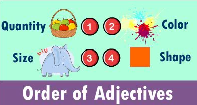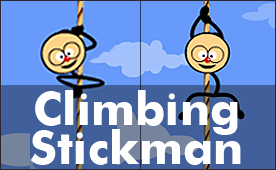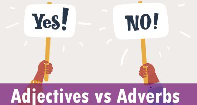Change Avatar
Adjectives Vs Adverbs
Adverb vs Adjective
Adverbs and Adjectives are both parts of speech used to modify or describe things, but the part of speech they modify differs
What’s the Difference?
Adverbs describe VERBS. An easy way to remember this is that they ADD meaning to a VERB. They are usually easy to spot because they often end in the suffix -LY.
Example:
- The duck swam quickly.
- The adverb quickly describes the verb swam.
Adjectives describe NOUNS. They can come directly before the noun or after a verb.
Example:
- The young duck swam.
- The adjective young describes the noun duck.
How Do They Work Together?
You can put them together in a sentence to add specificity and meaning.
The young duck swam quickly.
This sentence tells us a lot more than either of the original sentences above. We can infer that the duck swam quickly because it was young. The more detail you have, the better you can understand the situation - adjectives and adverbs make this magic happen!
CAREFUL!
Two common pitfalls people make when it comes to adjectives and adverbs are not knowing how to identify it because the word is the same, or incorrectly using the proper form of the words.
Pitfall #1 - The Same Word, Different Function
Some words can be both an adjective AND an adverb depending how or where they are used in a sentence. You always have to ask which word it modifies or describes to determine whether it’s an adjective or an adverb!
Here are some common examples:
Pitfall #2 - Incorrect Usage
Sometimes we get so used to hearing a word used incorrectly that it sticks in our mind and sounds right. Sometimes we hear both ways and just get confused! When you know what the word is modifying, you’ll know which to use and what form.
Here are some commonly misused modifiers:
| Word | Adjective | Adverb |
|---|---|---|
| fast | That’s a fast car | He drove fast. |
| just | We just left the house. | The judge is just. |
| late | This will be a late night. | We arrived late to the party. |
| most | Most kids love candy. | This is the most delicious candy. |
| right | I write with my right hand. | Turn right at the sign. |
| rough | This is rough sandpaper. | The athletes played rough. |
BAD
Adjective - when it’s used with a linking verb (be, feel, seem) to describe a noun or pronoun.
Say, “She feels bad that he can’t come.”
Not, “She feels badly that he can’t come.”
Adverb - when it modifies an action verb
Say, “Football games often end badly when both teams are upset.”
Not, “Football games often end bad when both teams are upset.”
EASY or EASILY
EASY is an adjective when it modifies a noun or pronoun, possibly with a linking verb
Say, “This test seemed easy.”
Not, “This test seemed easily.”
EASILY is an adverb when it modifies a verb.
Say, “The skaters danced easily around the rink.”
Not, “The skaters danced easy around the rink.”
GOOD or WELL
This is the most frequently misused pair of the group!
GOOD is an adjective that modifies a noun or a pronoun, often with linking verbs.
Say, “It felt good to see her again after so long.”
Not, “It felt well to see her again after so long.”
WELL can be used as both an adverb and an adjective, but with different results.
As an adverb…
Say, “She draws really well.”
The adverb well modifies how she draws - well = expertly.
Not, “She draws really good.”
As an adjective…
Say, “She was sick for a while, but she looks very well now.”
The adjective well modifies how she looks (a linking verb) meaning “in good health.”
REAL or REALLY
Another commonly misused pair!
REAL is an adjective used to modify nouns or noun phrases, meaning “true” or “genuine.”
REALLY is an adverb used to modify adjectives, other adverbs, or verbs, meaning “very.”
Say, “Sarah did really well on her driver’s exam.”
Not, “Sarah did real well on her driver’s exam.”
SLOW or SLOWLY
SLOW can be used in two ways - as an adjective or an adverb.
Adjective: This music is slow.
Adverb: The turtle is crawling slow.
SLOWLY is only an adverb and can be used as such, but it can replace SLOW wherever it is functioning as an adverb.
Say, “The turtle is crawling slowly.”










